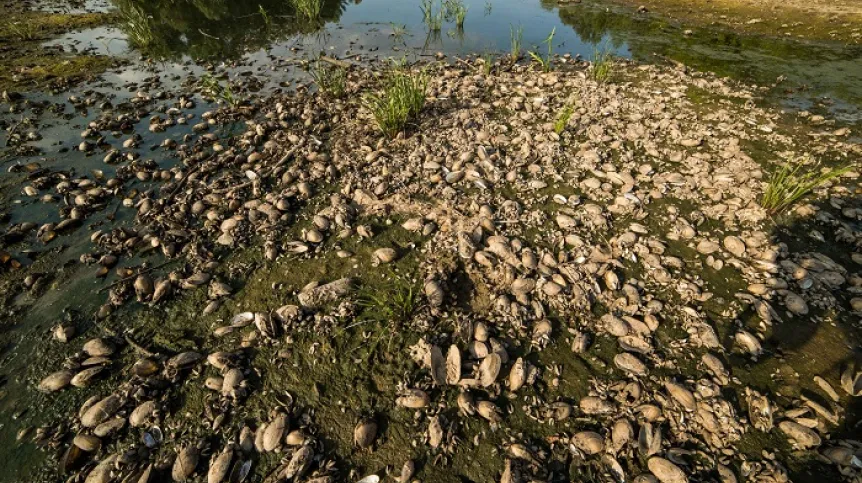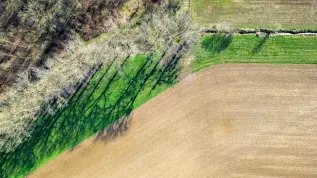
Freshwater mussels are found across the globe, they are also one of the fastest disappearing and least studied groups of animals in the world.
Scientists have now identified threats relevant to the conservation of these animals. They present their results in Global Change Biology.
Tadeusz Zając, a professor at the Institute of Nature Conservation of the Polish Academy of Sciences said: “Sailors in the era of discovering the New World could not predict what would happen to them in the future, but they could observe the horizon and react early to the signs of weather changes or the masts of pirate ships appearing there. A similar idea is behind the +horizon scan+ method - it consists of inviting a small but very competent team from around the world, which identifies new, unknown problems in order to anticipate events and prepare for them. It is not about predicting the future, but rather identifying the events that are already visible to experts.”
He added that freshwater mussels are among the most endangered groups of organisms in the world. He said: “They are of great importance for the functioning of freshwater ecosystems due to their ability to effectively filter water, inactivate suspensions and pollutants, thanks to which they improve not only water quality, but also the functioning of other freshwater organisms. Despite their widespread occurrence and the large biomass in natural watercourses, they are unknown to societies and therefore their extinction goes unnoticed.”
Studies on the protection of freshwater mussels are carried out by a network of several dozen scientists from Europe and the world, as part of the European project COST CA18239. The 'CONFREMUS' network has initiated the process of global monitoring of the horizon of events that may affect the extinction of this group.
“Based on publications and personal experience, each of the experts identified some problems and phenomena important for the conservation of mussels. A total of 56 of them were identified. Then, in the course of several rounds of discussion over the anonymous descriptions of phenomena, the group selected 14 threats and divided them into five groups,” Zając says.
GROUP ONE: AUTECOLOGY
According to Zając, it turns out that, as is usually the case with invertebrates, little is known about this group, and without this it is difficult to assess the causes of the recently observed mass extinctions of mussels. Despite their widespread occurrence, biomass and huge impact on ecosystems, it is not known what determines their condition. The scientist emphasises that the situation is similar with their food, which is known only from very general studies. Molluscs are highly vulnerable to pathogen attacks, especially to parasites, and this process can be of great importance when, for example, 75% of the population may be infertile due to a parasitic fluke invasion.
GROUP TWO: POPULATION
In most developed countries, significant resources are invested in the active protection of mussels, the scientist remarks, But this is done without sufficient scientific background and impact assessment of such projects, which may not be positive.
'An interesting and still little researched issue is the complete dependence of the development of large freshwater mussels on the period of the larva, which in order to metamorphose must parasitize for quite a long time on the appropriate species of fish - these relationships are still poorly understood, even for highly endangered species', he emphasises in the press release.
GROUP THREE: GLOBAL THREATS
They are primarily related to the shrinking of freshwater resources observed all over the globe. The problem is strengthened by the continuous demand for aggregates (sand, gravel) available in river valley areas. Aggregates are the second most exploited natural resource after fresh water. Both phenomena are damaging for mussel habitats, and will only increase as the world becomes more urbanized.
A completely unexpected threat is the contamination of fresh waters with drugs, hormones and cosmetics that have a strong biological effect, such as antidepressants that artificially trigger reproduction in mussels. Global pollution with nanomaterials (e.g. micro/nanoplastic) has already been identified, it is known that mussels can remove them, but the impact of this factor on the mussels themselves is unknown. We do not know the possibility of synergies, for example, between antidepressants that artificially induce reproduction in mussels and contraceptives that change the sex of their hosts, i.e. fish. Both of these pollutants are found in significant amounts in rivers downstream from urban areas. Many countries carry out river restoration projects, which are an opportunity for the preservation of mussels, but in many cases they can lead to the extinction of this group.
GROUP FOUR: BIODIVERSITY
Most assessments of global biodiversity do not include invertebrates, and that also applies to mussels. Even the taxonomy of this group has not been elaborated for very large areas of the globe, nor has the distribution, centres of species diversity and genetic diversity, while the extinction of mussels is very rapid.
GROUP FIVE: ECOSYSTEM BENEFITS
Although it has been assumed for a long time that the ecosystem role of freshwater mussels is huge, the degree of research on this phenomenon is negligible, the scientist emphasises.
He adds that these mussels provide many goods and benefits: food for humans and animals, medicines, cosmetics, decorative material (shells, mother-of-pearl and pearls), purify water, inactivate harmful substances, affect the circulation of substances in ecosystems, create habitats for other species, they modify food webs, in some cultures they have a cult or ornamental meaning. These benefits of mussels are unknown to the general public, and without raising their awareness, effective conservation of mussels and freshwater resources will be impossible.
Professor Zając believes that 'surveillance of the horizon has one major advantage: it allows you to act in advance'.
“We can avoid many losses before the unfavourable phenomenon occurs or spreads by going against the saying that hindsight is 20/20,” he says.
The results of the scan of threats affecting mussels have been published (open access) in the journal Global Change Biology. In addition to Professor Zając, co-authors are experts from the US, UK, Australia, South Africa, Russia, Czechia, Germany, Portugal, Italy and Argentina.
PAP - Science in Poland
zan/ kap/
tr. RL













